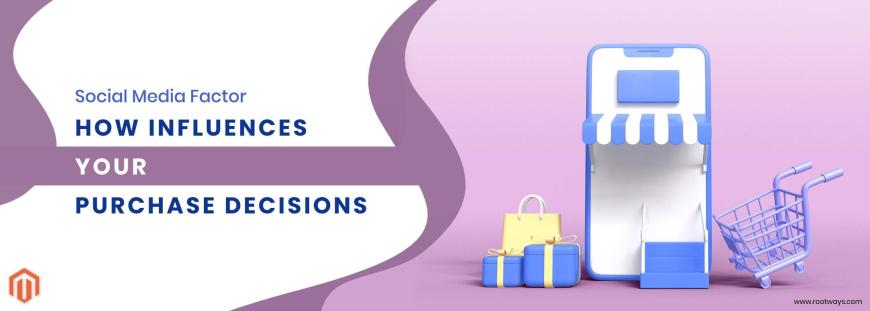
Social Media Factor: How influences your purchase decisions
Previously people spent time on television, newspapers, magazines, etc., to get ideas about the world and for entertainment. Nowadays, people use social media for entertainment because it is easy to access through mobiles.
An internet user generally spends 6 hours and 53 minutes online each day! - Forbes
Social media has become a significant part of our lives, and it's no surprise that it has also become a powerful marketing tool for businesses. With the rise of social media platforms like Facebook, Instagram, Twitter, and TikTok, brands have a new way to reach potential customers. Social media is now an essential part of their marketing plans. In this blog, we'll explore the social media factors that influence purchase decisions.
Let's examine how social media affects consumers throughout the purchase process and consider what businesses can do in the present to boost their social media game.
- Social Proof
It's a concept that people imitate others' behaviour to model it after them in particular circumstances. For example, when someone posts about their experience with products or services on social media, their followers see it and get an idea about that product. If they already know about that product, they might give it a try based on your recommendations. Social proof can come in the form of likes, comments, and shares.
If someone posts about a good place to hang out with friends, such as cafes, their followers from nearby areas will also plan. In the same way, if someone sees a post of their friends or followers using some product, they also get influenced by that.
According to Forbes, social media posts from friends have an 81% influence on consumers' purchase decisions.
Brands encourage their customers to share their reviews and experience with them on social media. Brands are a partnership with influencers who have a large number of followers.
- User-Generated Content
User-generated content, also known as UGC, is any content people create and spread based on their experiences, viewpoints, ideas, or feedback.UGC is the brand-relevant material as it relates to marketing. UGC could be in any form, like an image, video, reel, blog, podcast, review, or testimonial.
According to statistics from the 2022 Index, 39% of customers want businesses to provide actual customer demos or testimonials.
UGC can be shared by customers, Brand loyalists, employees, or UGC creators.UGC is valuable because it provides an accurate and trustworthy view of a brand's products or services. As a result, it helps a brand to grow its community and build loyalty.
- Brand's social media presence
A brand's social presence means the daily post of products, customer interaction, promotions, discounts, deals, and social media campaigns. The brand has to post creative content on social media to attract customers. Some research says that Consumers are 71% more likely to purchase as a result of social media recommendations.
Good customer service also attracts a customer in purchasing decisions. Therefore, businesses have to provide quick and satisfying solutions to customers' questions. On social media, brands can increase customer trust and loyalty by offering superior customer service. Therefore, brands must be courteous, sympathetic, and professional when responding to customer questions and complaints on social media. Also, brands should have a strategy for responding to unfavourable remarks or reviews on social media.
- Influencers
An influencer is a person who influences viewers by recommending a product or service. Influencers are people who have a more number of social media followers and have the power to influence their followers' purchasing decisions. Influencers can work with brands to market their goods or services to their audience. Influencers can provide sponsored content that appeals to their audience while showcasing the brand's goods or services. Brand select influencers based on the influencer's niche, engagement, and authenticity. A brand can enhance awareness and reach new audiences by collaborating with the appropriate influencer. Influencers can be celebrities or famous personalities. People get influenced by celebrities and follow their actions. But nowadays, brands choose Instagram, Facebook, and youtube influencers to give creative and honest reviews about products.
Here is some research on how fast this influencer marketing is growing. 40% of consumers have purchased after viewing products on Twitter, YouTube, or Instagram, while 49% rely on influencer recommendations.
- Social Media Advertising
Brands can use targeted social media advertising to reach their intended audience. For example, different social media platforms like Facebook, Instagram, and Twitter can start advertising to connect based on their interests, behaviors, and demographics. That helps increase sales because businesses focus on people interested in their products or services.
According to studies, customers who use social media while shopping are four times more likely to spend more money.
In conclusion, social media has become a powerful tool for businesses to reach potential customers and influence their purchase decisions. By leveraging social proof, user-generated content, influencers, social media advertising, the brand's social media presence, and excellent customer service, brands can build trust, loyalty, and sales on social media.